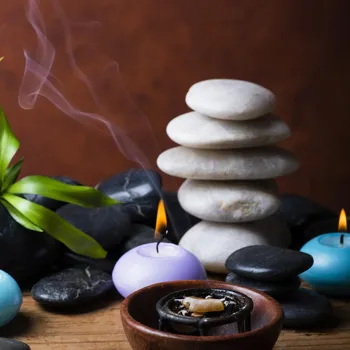Discover the key lifestyle habits for happiness and wellbeing! Dive into 9 powerful areas to enhance your life
In the hustle and bustle of modern India, finding genuine happiness and sustained wellbeing
can feel like a distant dream. We’re constantly bombarded with information, deadlines, and expectations, leaving us feeling drained and disconnected.

But what if I told you that cultivating happiness wasn't about grand gestures or drastic changes, but about adopting simple, yet powerful lifestyle habits? These habits, rooted in ancient wisdom and modern science, can pave the way for a more joyful and fulfilling life.
Let's explore nine key areas where you can make a real difference in your overall wellbeing, one step at a time. Remember, it's a journey, not a destination!
Cultivating gratitude leads to happiness and contentment
One of the most fundamental pillars of happiness is cultivating gratitude. In our fast-paced lives, it's easy to focus on what we lack, constantly striving for more. Taking a moment each day to appreciate the good things in your life can shift your perspective dramatically.

This could be as simple as writing down three things you're grateful for – the warmth of the morning sun, a kind word from a friend, or the delicious taste of your chai.
Practicing gratitude trains your brain to focus on the positive, fostering a sense of contentment and reducing feelings of envy or dissatisfaction. Regularly expressing gratitude can boost your mood, improve your relationships, and even enhance your physical health.
Incorporate gratitude journaling into your daily routine, verbally express appreciation to those around you, and actively look for the good even in challenging situations. This simple habit can transform your outlook on life and lay the foundation for genuine happiness.
Remember, gratitude is not just a feeling; it's an action, a way of seeing the world and your place in it.
Practice mindfulness for inner peace and clarity in daily life
Mindfulness, the practice of being fully present in the moment, is another powerful tool for enhancing wellbeing. In today’s world, our minds are constantly racing, jumping from one thought to another.

We're often so caught up in worrying about the future or dwelling on the past that we miss the beauty and joy of the present moment. Mindfulness involves paying attention to your thoughts, feelings, and sensations without judgment.
You can practice mindfulness through meditation, focusing on your breath, or simply being aware of your surroundings as you go about your day. Even a few minutes of mindfulness meditation each day can significantly reduce stress, improve focus, and increase self-awareness.
By cultivating mindfulness, you learn to observe your thoughts and emotions without getting carried away by them, creating a sense of calm and inner peace. This allows you to respond to situations with greater clarity and composure, rather than reacting impulsively.
It's about savoring each experience, appreciating the simple things, and finding joy in the here and now.
Regular physical activity boosts mood and reduces stress for overall wellbeing
Physical activity isn't just about physical health; it's also a powerful mood booster. Regular exercise releases endorphins, which have mood-elevating effects, and reduces stress hormones like cortisol.
You don't need to run a marathon to reap the benefits; even a brisk walk, a session of yoga, or some light stretching can make a significant difference. Find an activity that you enjoy and make it a part of your routine.
This could be anything from dancing to gardening to playing your favorite sport. The key is to find something that you find enjoyable and sustainable. Exercise also improves sleep quality, which in turn contributes to better mood and overall wellbeing.
Aim for at least 30 minutes of moderate-intensity exercise most days of the week. Remember, it's about progress, not perfection. Even small amounts of physical activity can have a significant impact on your happiness and wellbeing.
So, get moving and experience the joy of a healthy and active lifestyle!
Nurturing social connections is vital for happiness and wellbeing - focus on quality relationships
Nurturing strong social connections is crucial for happiness and wellbeing. Humans are social creatures, and we thrive on meaningful relationships with others.
Spending time with loved ones, connecting with friends, and engaging in community activities can provide a sense of belonging, support, and purpose. Make an effort to cultivate and maintain your relationships.
Reach out to friends and family, plan regular get-togethers, and be present when you're with them. Volunteering your time and helping others can also be a rewarding way to connect with your community and foster a sense of purpose.
Remember, quality is more important than quantity when it comes to social connections. Focus on building deep and meaningful relationships with people who uplift and support you.
Having a strong social network can buffer you against stress, improve your resilience, and increase your overall happiness.
Adequate sleep is crucial for physical and mental health
Adequate sleep is often overlooked, but it's essential for both physical and mental wellbeing. When you're sleep-deprived, your mood suffers, your cognitive function declines, and your stress levels increase. Aim for 7-8 hours of quality sleep each night.

Create a relaxing bedtime routine to help you wind down before sleep. This could include taking a warm bath, reading a book, or listening to calming music.
Avoid screen time (phones, tablets, laptops) for at least an hour before bed, as the blue light emitted from these devices can interfere with sleep. Create a dark, quiet, and cool sleep environment. Consistency is key, so try to go to bed and wake up at the same time each day, even on weekends.
Prioritizing sleep is an investment in your overall happiness and wellbeing. When you're well-rested, you're better able to cope with stress, focus on your goals, and enjoy life to the fullest.
Embrace lifelong learning for mental stimulation and growth
Learning something new is a great way to keep your mind active and engaged. It doesn't have to be a formal course; it could be anything from learning a new language to mastering a new skill to exploring a new subject.

Engaging in learning activities stimulates your brain, boosts your confidence, and provides a sense of accomplishment. This could involve reading books, watching documentaries, taking online courses, or attending workshops. Choose something that interests you and that you're passionate about.
The process of learning is often enjoyable in itself, and it can also open up new opportunities and experiences. Continuous learning promotes intellectual growth, keeps you curious and engaged with the world, and contributes to a sense of purpose and fulfillment.
So, embrace lifelong learning and discover the joy of expanding your knowledge and skills.
AI Generated Content. Glance/InMobi shall have no liability for the content












